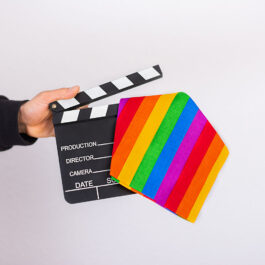In cinema, people of colour have often fought to have their stories told, campaigning in the face of societal and industrial prejudices. While there is still work to be done, cinemas and streaming services today offer a much more diverse range of movie experiences, many of which are inspired by people who broke barriers in the past. We highlight just some of the names who have made us laugh, cry, and look at the world differently.
Chadwick Boseman
It seems fitting to start with an actor who continues to inspire multiple generations. He recreated history by playing both baseball legend Jackie Robinson (42), Godfather of Soul James Brown (Get On Up), and first African American Supreme Court Justice Thurgood Marshall (drama Marshall). He became a global superstar, however, with Black Panther, the first non-white lead in the Marvel Cinematic Universe. Combining social responsibility with Hollywood spectacle, Boseman became an immediate icon to millions, but at the height of his popularity fought a secret battle with cancer that eventually claimed his life last year. The wave of tributes across the globe is all you need to know about the impact the actor had in just 43 years of life.
Noble Johnson
A century prior to Boseman’s success, actor Noble Johnson was also trying to tell stories that reached a wider audience. An actor within the Hollywood studio system during the Silent Era (he appeared in 1933’s King Kong and Boris Karloff’s The Mummy), he became frustrated by the limitations of roles available to Black actors which relied on stereotyping. He founded The Lincoln Motion Picture Company in 1916, the first studio to focus on films made for black audiences by black creatives and casts. While it lasted only seven years, Johnson and his work laid the foundations for others to build on in years to come.
Ava DuVernay
Ava DuVernay broke several glass ceilings with Selma, her 2014 biopic of Civil Rights leader Dr Martin Luther King. She became the first Black woman to be nominated for a Golden Globe for directing, and the first Black woman to direct a film nominated for Best Picture. A powerful, imaginative filmmaker, she combines her narrative work with jaw-dropping documentaries such as 13th (for which she received another Oscar nomination) and many powerful drama series. She has been at the forefront of addressing inequality in the American film industry, fighting for a fairer path for those who come after her.
Sidney Poitier
In the 1960s, Sidney Poitier became one of the biggest draws in the film industry with a string of hits that challenged mainstream perceptions of Black characters on screen. His trio of classics: To Sir, With Love; In The Heat of The Night; and Guess Who’s Coming To Dinner?: put a spotlight on conversations America was hesitant to have. Very aware of his importance at a time of great change, he appeared at Civil Rights marches such as The March On Washington, which witnessed Dr Martin Luther King’s ‘I Have A Dream’ speech. To this day, he is noted by Hollywood greats as a true pioneer of the industry.
Channing Godfrey Peoples
From an established history maker to a potential future ground breaker. Channing Godfrey Peoples’ drama Miss Juneteenth, about a mother trying to achieve her goals despite systemic racism, wowed critics and audiences as it became nominated for two Independent Spirit Awards. Inspired by political events in the past year, her follow up was the short Dorothea’s Blues, which demonstrated a gift for storytelling that will make the filmmaker’s next steps intriguing to follow.
Samuel L. Jackson
One of the most popular stars of all time also remains one of the busiest even at 72 years of age. Coming to film acting relatively late, Jackson would appear in small roles in films such as Goodfellas and the work of director Spike Lee until an Oscar nominated performance in 1994’s Pulp Fiction thrust him into the stratosphere. Since then, he has been at the centre of the Marvel Cinematic Universe, had regular reunions with Quentin Tarantino, and delighted audiences in over 150 film appearances (and counting). An unforgettable performer, he remains the benchmark for actors of all backgrounds.
Sir Steve McQueen
“Everyone deserves not just to survive, but to live”. This moving statement came toward the end of Sir Steve McQueen’s Oscar speech, as his film 12 Years A Slave took Best Picture in 2014. The British filmmaker became the first Black winner of the Best Director Oscar that same night, the crowning achievement of a career of cutting-edge storytelling. From his early, intense dramas like Hunger and Shame, to his Small Axe anthology series for the BBC, few artists can inspire as much discourse and awe with every new work.
Mya Taylor
While LGBTQ+ representation is growing on television, in movies it is still tough to be seen. Mya Taylor made history with her debut in 2015’s Tangerine, Sean Baker’s wild comedy-drama set during Christmas Eve. Her win for Best Supporting Actress at the Independent Spirit Awards was the first for a transgender woman at the awards, while her and co-star Kitana Kiki Rodriguez’s Oscar campaign was the first time a studio would support transgender performers. While she doesn’t have the same breadth of work as others on this list (Tangerine was her acting debut, having worked for years as a sex worker in Hollywood), the impact of her performance and win will be felt for years to come.
Spike Lee
For just under 40 years, Brooklyn’s favourite son has made films that demanded attention. Funny, complex stories like 1989’s Do The Right Thing and debut She’s Gotta Have It made his name, before capturing the mood of a vast community in the 1990s with powerful dramas Malcolm X and Get On The Bus. A fiery voice of protest to this day, the basketball-loving award-winner is just as comfortable working with big studios on films like Inside Man, and Netflix’s Da 5 Bloods. Whatever the platform, he continues to show each generation that it’s vital to tell a story your way.
Denzel Washington
Quite simply one of the greatest actors of all time, Denzel Washington broke through in the Eighties and became known for roles that drew you to the edge of your seat. Taking on the lofty role of Malcolm X in Spike Lee’s film of the same name, his glittering career has seen him play everything from a corrupt cop in Training Day to a campaigning lawyer in Philadelphia, and at 66 years old still has fans beaming with excitement for forthcoming Shakespeare adaptation The Tragedy of Macbeth. His work on stage and screen has set the standard not just for representation in Hollywood, but for actors everywhere.
Halle Berry
“It’s for every nameless, faceless woman of colour that now has a chance because this door tonight has been opened”. This was the dedicated Halle Berry gave when she became the first Black woman to win Best Actress at the Academy Awards in 2002, for her performance in Monster’s Ball. An A-Lister who has been part of the Bond, X-Men, and Kingsmen franchises, she has also remained a vocal advocate for many important issue. However, Hollywood history will always be changed by the time she used her moment on the industry’s biggest stage to acknowledge those who came before, and after.
Dorothy Dandridge
One of the actors Berry dedicated her award to, singer and actor Dandridge died in 1965 aged just 42. However, years later, statues and murals to her legacy are found across America, while modern artists find inspiration in her, such as Janelle Monae, who wrote the song Dorothy Dandridge Eyes. The reason for this acknowledgement comes from a career enjoying the kind of success and influence that would not only inspire future Black performers, but create a body of work to rival many leading ladies of cinema. She was the first African-American film star to be nominated for an Oscar, for the iconic Carmen Jones, a 1954 musical that has since been paid homage to by Beyoncé. A star that burned briefly, but brightly enough for the whole world to see.
Richard Pryor
His comedy may have been controversial, but Pryor broke the mould when it came to stand-up, and cinema. Known to have influenced practically every stand-up that followed him, Pryor was described as the ‘Picasso’ of comedy, and turned that hilarity into becoming one of the biggest cinematic stars of the Eighties with hits like Brewster’s Millions and Stir Crazy. Health issues meant his acting career was cut short around a decade before his death in 2005, but his determination to push the envelope in every artistic endeavour ensures his legacy will never be forgotten.
Jordan Peele
How do you shake up the horror industry? By weaving real life context into your story of terror. Jordan Peele, up to that point known for his comedy, would become a major name behind the scenes thanks to Get Out, a huge 2017 hit that was inspired by race relations in America. He furthered his success with follow-up Us, TV show The Twilight Zone, and is set to continue that with the ominous forthcoming project Nope. However, Peele has also used his influence as a producer to champion new filmmakers and acting talent, including Candyman director Nia DaCosta.














Sorry, the comment form is closed at this time.